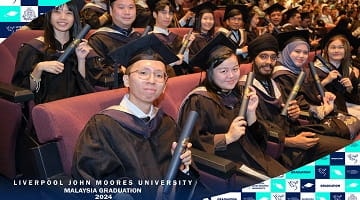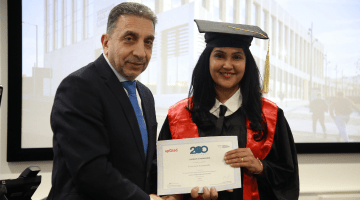Course modules
What you will study on this degree
Further guidance on modules
Modules are designated core or optional in accordance with professional body requirements, as applicable, and LJMU’s Academic Framework Regulations. Whilst you are required to study core modules, optional modules provide you with an element of choice. Their availability may vary and will be subject to meeting minimum student numbers.
Where changes to modules are necessary these will be communicated as appropriate.
Core modules
Contracts, Copyright and Intellectual Property
15 credits
15 credits
Students will gain confidence in their understanding of and engagement with UK Copyright Law, Intellectual Property legislation and the primary purposes of Contracts, as they relate to the Creative Industries and Performing Arts.
Creating Content
15 credits
15 credits
Students will gain a confident understanding of how secondary creative content is used and produced across the performing arts and creative industries. Students will also be taught, mentored, and guided in the application of specific contemporary creative digital skills, regarding the production and delivery of media content, relevant to the creative industries and performing arts.
Funding for the Creative Industries and Performing Arts
15 credits
15 credits
By the end of this module students will have developed students will gain an understanding of and engaged with a variety of funding and subsidy opportunities and application processes. They will also be able to produce a balanced break even budget, giving them important skills that they will draw on during the rest of their careers.
Critical Skills for Managers
15 credits
15 credits
Students will become confident in the use of Critical Skills, including referencing, research, information analysis, presentation techniques and analytical objectivity.
The Contemporary Creative Industries
15 credits
15 credits
Students will develop an understanding and analysis of the contemporary creative industries and performing arts landscape.
They will learn about the industry's key organisations, leading practitioners and executives and recognise how cultural policies impact upon the creative industries and performing arts locally, nationally, and internationally.
Understanding Marketing for the Creative Industries and Performing Arts
15 credits
15 credits
What is marketing? How do we connect with audiences in a way that is authentic, planned and most importantly, relevant? How do you begin to gain attention for your artist, show, project or event? Marketing is a sales tool, but it is also something that needs to be creative, engaging, unique and visible. In this module, you will study marketing theory and develop your understanding of concepts, tools and campaign planning. You will examine case studies, looking at examples of marketing campaigns with a focus on target markets and reaching that all important target audience.
The invaluable tools you will learn will be adaptable to whichever path you take for your chosen future career and a key preparation for studying marketing strategy at Level 5.
Practical Creative Project
30 credits
30 credits
Under the guidance of their module leader, students will form small groups, and collaboratively devise, design, manage and deliver a limited but engaging, practical creative project, of any sort, appropriate to the creative industries and performing arts sector.
The design and format of their project will be negotiated with their Module Leader, in line with the Learning Outcomes.
Students will also be supported in both identifying and involving themselves with a range of other collaborative practical creative projects, both internal and external to LIPA.
Core modules
Audience Insights and Data Analytics for the Creative Industries and Performing Arts
15 credits
15 credits
Word of mouth is still cited as the biggest influence on a consumer's cultural decision making, but how do you know when youve created that buzz and more importantly, once you have, how do you know its working? This module will introduce you to the types of research and marketing methods that professional creative industries and performing arts managers use when designing and analysing their own marketing campaigns. You will work with various online insights platforms and more importantly, be guided on how to ask the right questions of the data in front of you.
The digital world is a crowded marketplace, and as the international marketing expert Seth Godin said, You cant be seen until you learn to see.
Business in the Creative Industries and Performing Arts
15 credits
15 credits
Students will be introduced to business concepts that are relevant to small to medium sized commercial enterprises operating within the creative industries and performing arts.
A particular focus will be on, establishing a start-up business, methods of financing, managing the legal requirements set by the UK Government, and the important relationship between copyright legislation and the viability of SME organisations operating in the creative industries and performing arts.
Strategic Marketing Techniques
15 credits
15 credits
Building upon the Level 4 Understanding Marketing module and looked at from the perspective of the Creative Industries and Performing Arts, students will learn and apply the key steps to developing a strategic marketing plan and expand their knowledge of broader marketing techniques and their cultural context. The course also introduces students to brand identity, messaging and communication, e-marketing, pricing strategy and PR practice.
Personal and Professional Development for Managers
15 credits
15 credits
Students will be guided, mentored, and taught how to engage with their own personal and professional development, helping them construct a flexible and coherent strategy, in respect of their own learning and career aspirations.
A series of guest seminars with professional industry executives will also contribute to students' understanding of management as it exists within the creative industries and performing arts.
Practical Project
30 credits
30 credits
Building on their learning and experience at Level 4, students will be taught, guided, and mentored in understanding, analysing and applying the skills, strategies and managerial creativity, required to successfully produce and deliver a practical project, of any sort, appropriate to the broad creative industries and performing arts sector.
Optional Modules
Legal, Safe and Sustainable Events and Projects
15 credits
15 credits
This module will equip students with the requisite skills, competencies, and knowledge to effectively design and deliver well planned and appropriately resourced legal and safe events and projects across the Creative Industries and Performing Arts.
This module will be delivered utilising a range of teaching and learning strategies to include:
- Lectures to introduce key issues and concepts
- Workshops, and a range of innovative classroom and online methods, incorporating application of concepts to different situations, utilising group activities where appropriate
- Site Visits
- Engagement with sector professionals
- Self-directed study.
Managing Live Events
15 credits
15 credits
This module will equip students with the requisite skills, competencies, and knowledge to effectively plan and deliver creative industry and performing arts events and projects that account for all stakeholder and audience needs
This module will be delivered utilising a range of teaching and learning strategies to include:
- Lectures to introduce key issues and concepts
- Workshops, and a range of innovative classroom and online methods, incorporating application of concepts to different situations, utilising group activities where appropriate
- Site Visits
- Engagement with sector professionals
- Self-directed study.
Music Industry Management
15 credits
15 credits
In this Module students will gain the knowledge, insight, and skills needed to analytically devise, design and deliver a coherent and constructive, music industry management project of their own choosing.
The assignment project will be mentored and supervised by the Module Leader and will facilitate the development of the students' personal and professional resilience, planning techniques, research methods and creative managerial acumen, with a specific focus upon the Music Industry.
Popular Music - Context and Culture
15 credits
15 credits
In this Module, students will be provided with an engaging and contextual insight to the development of post 1950 Western mainstream popular music culture.
Looking at Western popular music, from both an aesthetic and cultural perspective, students will advance their knowledge and understanding of the developments which have shaped, and continue to shape, the creation and consumption of mainstream popular music across the West.
Original Production
15 credits
15 credits
Students will be guided by the Module Leader in their engagement with this Module's 'Original Production' management assignment. Students will be encouraged to manage creatively and resiliently, within limited means, in order to ultimately deliver an engaging and creative theatre or screen output.
Understanding Producing
15 credits
15 credits
This module will introduce students to the fundamental aspects of producing professional Theatre and Screen work.
Building upon much of the students' prior learning, they will be guided in the essential preparation and research work needed for producing an original production.
Students will negotiate with the Module Leader as to whether their preparation and research work will be completed in a group or on an individual basis.
Optional Modules
Enterprise Project
45 credits
45 credits
Students, guided by the Module Leader and their assigned Supervisor, will embark upon a semester long Enterprise Project, focussed on the development of their own enterprise concept or business idea, located within the broad creative industries, performing arts or entertainment sector.
Course tutors
-
 Lecturer/Senior Lecturer
Lecturer/Senior Lecturer
Tuition fees and funding
Entry requirements
Please choose your qualifications below to view requirements
Grades/points required from qualifications:
Work out how many UCAS points your qualifications are worth by visiting the UCAS Tariff Calculator.
Qualification requirements
A levels
We are committed to accepting students on to this course who have the potential to succeed in making performance possible and who will gain sustained work in the performing arts and entertainment industries. With this in mind we wish to identify through applications and interview or audition key attributes and achievements. The key attributes that we seek to identify are:
• Knowledge, ability and experience of organisation and management
• Commitment to the performing arts and public events
• Ability to work effectively with others
• Broad interest and engagement
• Self-awareness
• Spirit of enterprise.
The minimum educational standard that we are looking for is:
GCSEs
We normally require a minimum of five GCSEs grade C. These should include Maths and English, plus a minimum of 96 UCAS tariff points (2017 tariff) or 240 UCAS tariff points (2016 tariff).
We accept all types of equivalent qualifications, the following are the most common UK qualifications that people tend to apply to us with:
A/AS Level
This should be from three A Levels (i.e. grades C, C, C), excluding General Studies. Points from AS and Key Skills are not counted.
BTECs
Extended Diploma (i.e. Merit, Merit, Merit profile).
BTEC Diploma (i.e. Distinction, Distinction). Acceptable on its own and combined with other qualifications such as an A Level, in which case total needs to be 96 (2017 UCAS tariff points) or 240 (2016 UCAS tariff points) across both qualifications.
90 Credit Diploma. Only acceptable when combined with other qualifications such as an A Level.
International Baccalaureate
International Baccalaureate Acceptable on its own and with other qualifications. Welsh Baccalaureate Acceptable on its own but is ideally combined with other qualifications as it is equivalent to one A Level.
Alternative qualifications considered
Audition or Interview
Candidates are invited to audition/interview on the basis of completing the LIPA and/or UCAS application form. We look for evidence of the key attributes and an ability to achieve the qualifications standard. In exceptional cases people may be invited to audition/interview who have not met or are not on course to meet the qualifications standard. In these cases there must be substantial potential demonstrated against the other attributes. The audition or interview allows us to evaluate you as a practitioner in your area of interest. Offers of a place will follow where you demonstrate high ability and the potential to succeed. For this course the audition/interview format includes an introduction to LIPA, a critical writing exercise, a practical workshop, simple quantitative methods examination and an informal presentation of a prepared report and interview.
Equal Opportunity
LIPA is an equal opportunities organisation and aims to successfully recruit students from a wide range of different socio-economic and personal backgrounds. To ensure we provide effective equality of opportunity within the application process we carefully consider each application individually and acknowledge differences that can exist between applicants’ experiences from diverse backgrounds. We regularly update our approaches to take into account changing understanding of communities and cultures and we monitor applicant/student characteristics such as age, gender and ethnicity.
Recognition of Prior (Experiential) Learning [RP(E)L] and Credit Transfers
If you can demonstrate that you have already achieved learning equivalent to a module or modules, or a level of study, in the programme then you may be eligible to be awarded credit for this learning or to have credit transferred from another UK institution. You will be required to complete an application to have your qualifications or experience approved by the Head of Discipline and the university. This requires the presentation of appropriate evidence and we will map the evidence against the programme outcomes to be certain of equivalence. If approved credit will be awarded and you will proceed on to the appropriate level of the course to complete the remaining credit for the award.
Applicants, without the standard academic awards, but able to evidence experience of, or commitment to, the creative industries, performing arts or other entertainment sectors, are always encouraged to apply.
International requirements
Other international requirements
We welcome applications from students with qualifications from outside of the UK. Each application is considered on an individual basis and mapped to the appropriate entry level. We value the diversity of experience that students from different backgrounds bring to the course. We require an IELTS score of 6.
How to apply
Securing your place at LJMU
Your university life
From accommodation and academic support to clubs and societies. Find out what LJMU has to offer.
Related Links
Talk to our students
Connect with a current LJMU student for advice and guidance on university life, courses and more.
See what our students are saying
At LJMU we want you to know you're making the right choice by studying with us. You can see what our students are saying about their experience with us through their reviews on the following websites:
Related Links
News and views
Browse through the latest news and stories from the university










The university reserves the right to withdraw or make alterations to a course and facilities if necessary; this may be because such changes are deemed to be beneficial to students, are minor in nature and unlikely to impact negatively upon students or become necessary due to circumstances beyond the control of the university. Where this does happen, the university operates a policy of consultation, advice and support to all enrolled students affected by the proposed change to their course or module.
Further information on the terms and conditions of any offer made, our admissions policy and the complaints and appeals process.















